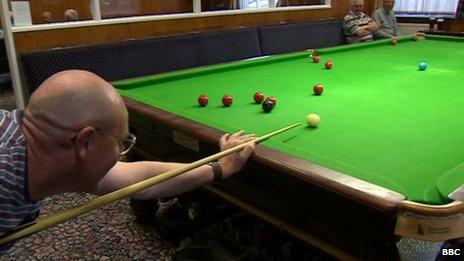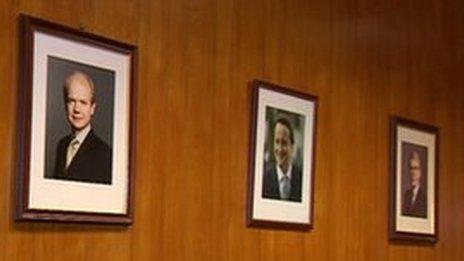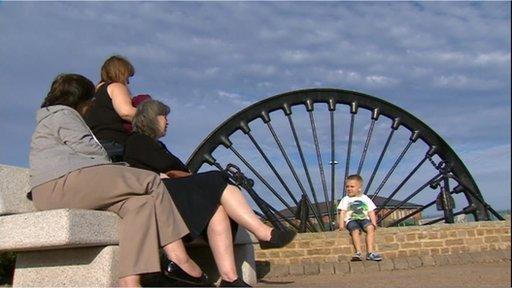The strange death of the Conservative working vote
- Published
- comments

Conservative club members in Seaham are keen on snooker but not so impressed by the current party leadership
On the face of it, Seaham is not a town where you'd expect to find many Tories.
This former mining community in County Durham has had Labour MPs for almost a century now. It's in one of the party's safest seats.
Yet it does have a thriving Conservative club, with around 250 active members.
Pit town
I should though make it clear though that if you join the club, you don't have to join the Conservative party.
You're just asked whether you vote Conservative.
But even that takes some guts in a former pit town.
The clientele are largely older, male and working class. So is this a haven for that relatively rare commodity - the northern working class Tory voter?
When I visited, I certainly did find some supporters, but many members seemed distinctly unimpressed by Cameron's Conservatives.
"Out of touch" was a common phrase - a feeling that Conservative millionaires might struggle to understand the concerns of working class northern voters.
One suggested the PM talked "out of the back of his head", another that the leadership were more interested in being celebrities than leading the country.
And even the club chairman Derek Dixon - who is a Conservative party member - feels his party is not in touch with ordinary voters.
He said: "We send a lot of money to the Conservative Party from the club and we expect them to listen to us. And if they don't listen to us they are going to lose the next election."
With friends like that…
Working class
But the Conservatives haven't always struggled to attract the working vote.
It's true to say Labour has been the dominant force in the North East for decades, but for many years there was a strong working class Conservative vote too.
It regularly helped deliver parliamentary seats in Darlington, in Teesside and in Tyneside that look likely to remain Labour in 2015.
It also gave them strong presences on councils in Durham, Newcastle and Sunderland. Even in Seaham the Conservative vote was healthier than it is now.

Hague, Cameron and Major all win places on Seaham Conservative Club walls but not Margaret Thatcher
So what went wrong?
Margaret Thatcher is often the easy answer.
And you'll find some evidence for that at New Seaham Conservative Club. While you'll find pictures of Churchill, Hague, Major and Cameron on its walls, you won't find one of the Baroness.
Derek Dixon admits it wouldn't go down well - and "wouldn't last".
Some members tell me the community hasn't forgiven Mrs Thatcher and her party for the closure of mines and shipyards.
Others do defend her government and point out Labour also closed local mines in the 60s and 70s, and there is an irony in the antipathy to Mrs T.
The Tory decline in the North East didn't really hit until the Major years. Margaret Thatcher attracted far more northern, working class supporters than David Cameron does - she did after all deliver two landslides.
Conservative fortunes
The Conservatives though did try to win back some of those voters in the run-up to 2010. A northern board was set up to try and revive Conservative fortunes, and target seats.
But the net result in the North East was the gain of just one - Stockton South - and even that with a wafer-thin majority.
Much of that push now seems to have been forgotten with the distractions and pressures of government.

Seaham is an old pit town, but even here the Conservatives used to be more successful than they are now
And Seaham club members certainly think some of their current concerns are not being tackled.
Immigration comes up a lot in my conversations with them. One talks about a nearby factory, where "90% of workers were East European". He claims local labour couldn't get a look-in.
The decision to protect overseas aid from cuts comes up too, as does the NHS, and inaction on the north-south divide.
But again and again it's the disconnection between the political elite and ordinary people that seems to dominate.
Should the Conservatives worry about this? Michael Howard once said the party could win a parliamentary majority without the North East's votes.
He might be correct, although the party has yet to prove him right.
Urban areas
Some Tories are worried though.
David Skelton was born and bred in the region and stood for the party in North Durham in 2010.
He's recently founded Renewal - a group dedicated to finding ways of broadening the Conservative appeal, targeting urban areas, the north and working class voters.
He sees an opportunity for the Tories to target voters that may also be disillusioned with Labour and the Liberal Democrats.
Amongst his ideas are rises in the minimum wage and styling the Conservatives as the "new workers' party".
But there is another complicating factor - UKIP believes it is now picking up those working class votes.
One who has switched is Ted Strike. A former trade unionist, he did vote Conservative for 40 years.
But in 2010, he joined UKIP, and next year he'll fight the Conservative seat of Stockton South for his party.
He said: "Over the years the Conservatives have changed a lot, and they're certainly not in touch with the people at all.
"Going back to Margaret Thatcher, a lot of people might not have liked her, but she was from a working class background. Now we have a lot of multi-millionaires who haven't got a clue about what's happening to Joe Public."
UKIP challenge
And Newcastle University politics lecturer Dr Nick Randall sees little prospect of a Conservative revival in the north.
He said: "If anything the signs are the decline has restarted, and 2010 was actually a blip of life before slipping back into a coma.
"And we now have got the challenge from UKIP for the right-of-centre constituency the Conservatives would hope to appeal to."
So whether it's UKIP, the Thatcher legacy, or the southern domination of the current Conservative party, the challenges do appear tough.
But if we are now entering an era of four-party politics, finding the key to the northern working class vote - and making Seaham Conservative Club true blue again - could yet be crucial.